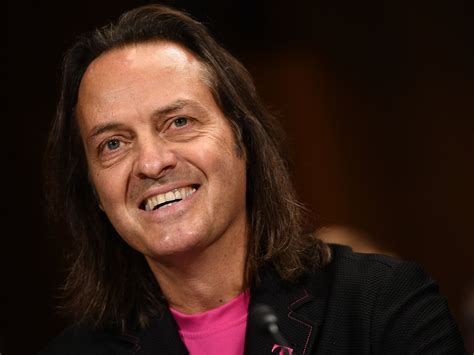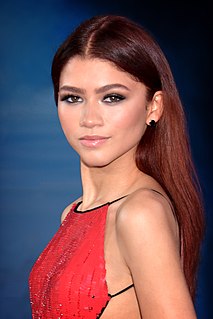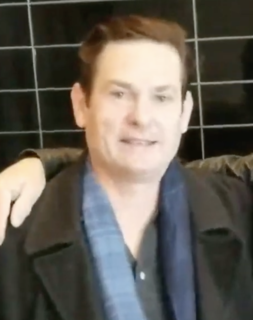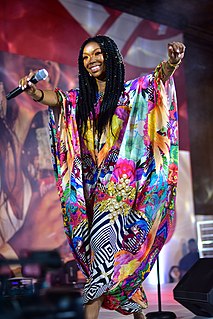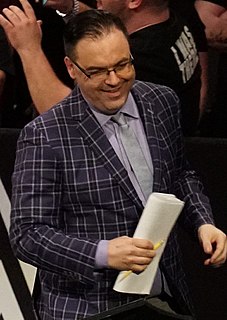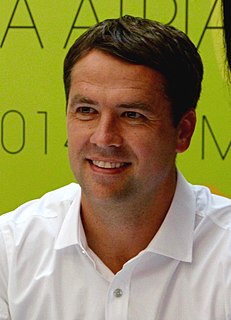A Quote by John J. Legere
T-Mobile is a young, consumer-driven business, and the average age of my customer outside of Bellevue is 27 or 28. They like outspoken, frank discussion. There was an event where it started to come together, I thought the audience would only care about the MLB guys, but they wanted to know what was on my mind. And I literally snapped about the state of the wireless industry. Over the next 24 hours, there was a lot of stuff that was coming out of my mouth that was meant to stay in Vegas, but it hit a chord. It was an action statement for me that I was going to fix this industry.
Quote Topics
About
Action
Age
Audience
Average
Business
Care
Chord
Come
Coming
Coming Out
Consumer
Customer
Discussion
Driven
Event
Fix
Frank
Going
Guys
Hit
Hours
Industry
Know
Like
Literally
Lot
Me
Meant
Mind
Mlb
Mobile
Mouth
Next
Only
Out
Outside
Outspoken
Over
Snapped
Started
State
Statement
Stay
Stuff
Thought
Together
Vegas
Wanted
Wireless
Would
Young
Related Quotes
To retire by the age of 35 was my goal. I wasn't sure how I was going to get there though. I knew I would end up owning my own business someday, so I figured my challenge was to learn as much as anyone about all businesses. I believed that every job I took was really me getting paid to learn about a new industry. I spent as much time as I could, learning and reading everything about business I could get my hands on. I used to go into the library for hours and hours reading business books and magazines.
When I was growing up, all the films about teenagers were played by Tony Curtis or John Cassavetes when they were 27, 28 years old. We would see these teenage movies in the theaters and I would say, "They don't look like they're my age at all." So I wanted to make a movie that was real and I wanted to make a movie that wasn't about me.
We did start with a simple manifesto, as we called it, which was a description of what we were about, and it was the Un-carrier. It was about finding and solving customer pain points in an attempt to fix a stupid, broken, arrogant industry. It was something we felt passionate about. It was our goal to make changes and have the industry make the same ones.
When I go onstage, I don't know what I'm going to say. I don't know what's going to come out of my mouth. It's one of those questions where any and everything is possible. I literally could be talking about somebody I was hanging out with two seconds ago or something from the news. Literally, there's really no rhyme or reason for it. I want to be free flowing like that.
I've figured out the secret. Your mind is your power; you have to work with your mind and work with your own thoughts about your own life. If you spend so much time thinking, "This industry is male-dominated. It's sexist. It's this. It's that," then that's what the picture will always be. I remember when I was coming up, I didn't have those thoughts. My mom told me I could be whatever I wanted to be and I could be as bright of a star as I was meant to be. So, that's where I put all of my focus and my thought...into what I could do. And I carry that with me now.
When I was in N.W.A. and didn't get paid all the money I was owed, that's when the business side of showbiz hit me. I thought, "Half of this is workin'. I'm famous, but now I need to be famous with some money." That got my brain started at trying to figure out the business end. And once I figured out the business side, I next came to understand that success really comes down to the product, not to me, my personality, or what club I'm seen going into or coming out of. None of that matters.
Fifteen years ago, nobody thought that content would ever work as a business. It was impossible to raise any money, initial investments were $10,000, seldom $100,000. It is only over the last two or three years that we have started to see very large amounts of capital coming into the digital industry. That has created a lot more competition.
It's sad. There's a lot about this industry that a lot of people don't know about and don't find out about. There are a lot of tough things and trials and stuff that you're faced with. Sometimes, God has other plans for people. Sometimes bands can't stick through it. It depends on the situation. Keep praying for the bands that you like, seriously, because a lot of things will try to get in the way of being together. We've been blessed with not deal with those yet, but if we ever did...?
